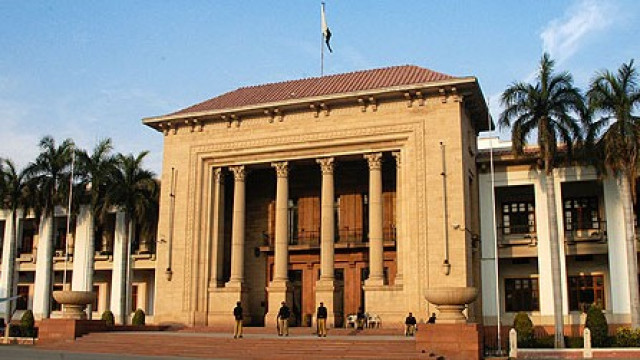Punjab Assembly: Bill passed to lift standards of higher education
Opposition remains absent from assembly.

The Punjab Assembly passed the Punjab Higher Education Commission (PHEC) Bill 2014 on Monday for the improvement and promotion of higher education, research and development in the province.
Under the bill, a Punjab Higher Education Commission will be constituted, with the chief minister being the controlling authority. The assembly also passed the Pakistan Kidney and Liver Institute and Research Centre Bill 2014. Both the bills were passed by the House in the absence of the opposition.

The passed bill on the PHEC calls for the formation of the commission, which will be headed by a chairperson, who shall be appointed by the CM. The chairperson shall head the commission for a tenure of four years and will not be eligible for more than two terms. The 17-member commission will include secretaries of the Higher Education, Agriculture, Health and Finance Departments, along with a nominee of the federal HEC. The commission shall also include three vice chancellors, one of those from a private sector university, nominated by the governor.
The PHEC will function to bring provincial higher education institutions at par with both national and international standards. It will also coordinate with the federal HEC in a result-oriented manner. It will formulate and recommend policies for operation of higher education institutions in the province, in line with the standards prepared by the federal HEC.
It will also monitor, evaluate and advise on matters of performance and quality enhancement at the institutions.
Earlier, the assembly passed a resolution extending the period of the PHEC Ordinance 2014 for a duration of 90 days from December 31 this year. The resolution was also passed in the absence of the opposition, with more than 100 members voting in favour.
The assembly also passed the Pakistan Kidney and Liver Institute and Research Centre Bill 2014 which shall function to constitute a centre for medical and surgical care, teaching and research for diseases of kidney, liver, bladder, prostate and pancreas.
It will provide treatment, will educate people and offer its services regardless of race, religion, ethnicity or financial status of patients. The institute will be run by a 14-member Board of Governors, headed by the CM.

During the session, MPA Dr Syed Waseem Akhtar expressed concern over reports of a US bounty set on Jamatud Dawa chief Hafiz Muhammad Saeed. He said that US was trying to interfere in Pakistan’s internal affairs and the government should protest against it.
Home Minister Col (retd) Shuja Khanzada said that the government had received no official notification in this regard.
The House debated the issue of schools security in the province in the aftermath of the December 16 incident in Peshawar. MPA Sardar Muhammad Jamal Khan Leghari said that Punjab was the only province in breach of the constitutional right of citizens to arm themselves for their protection. “If the government cannot provide security, it should not deny the citizens’ right to protect themselves,” he said.
The home minister said in order to improve the law and order situation, the government needed to streamline its institutions. “The government has teamed up with the National Database and Registration Authority (NADRA) to initiate a system that will offer arms licences starting from February 15 next year,” he said.
Khanzada said licences would be issued within 15 days. He said 1.8 million arms licences had been issued with almost 50 per cent of them being fake licences. “We need to set our systems right and that will require some time,” he said.
MPA Malik Muhammad Ahmad Khan also voiced similar reservations over the state of security in schools, adding that the society was living in a state of fear with the government further extending winter vacations. He called for the formation of a parliamentary committee to look into the matter which was well received by the House.
Law Minister Mujtaba Shujaur Rahman said that the government had released Rs2 billion for security arrangements at educational institutions. He said that a security plan had been devised for both private and public institutions. He said that no private institution would be allowed to raise fee in the name of security. Rahman said the government was also willing to give a briefing to the lawmakers regarding the school security plan. The speaker scheduled a briefing for next week. The question hour related to the Special Education and Environment Protection Departments.
The session will resume at 10am on Tuesday (today).
Published in The Express Tribune, December 30th, 2014.



















COMMENTS
Comments are moderated and generally will be posted if they are on-topic and not abusive.
For more information, please see our Comments FAQ